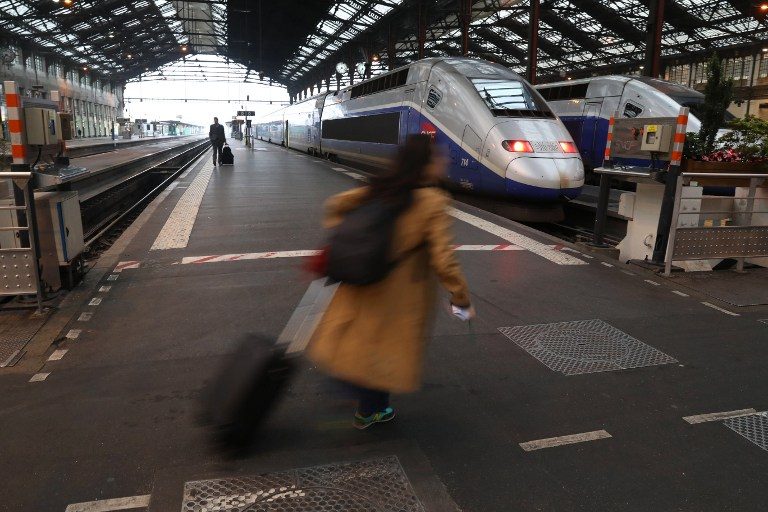SUMMARY
This is AI generated summarization, which may have errors. For context, always refer to the full article.

PARIS, France (UPDATED) – Transport chaos hit France on Wednesday, June 1, just 9 days before the Euro 2016 football tournament, as railway workers went on strike in the latest salvo of a months-long battle between the government and unions.
Around half of France’s trains were cancelled as workers from railway operator SNCF launched their 8th strike in 3 months, this time saying they will continue until demands for better pay and conditions are met.
“It’s a nightmare today – even more than the other strike days,” said Christine, an SNCF worker surveying the chaos at Ormesson station in the Paris suburbs, where commuters were struggling to squeeze on to one of the few trains that had shown up.
The strike has piled further pressure on the already deeply unpopular Socialist government, which has been besieged by months of protests and work stoppages over a controversial labor reform bill.
Subway workers in the capital were planning to walk off the job from Thursday, June 2, and Air France pilots have threatened a lengthy strike in the coming weeks, when Euro 2016 will be in full swing.
“This week will see the strongest mobilization in 3 months” of strikes, the head of the powerful CGT union Philippe Martinez said on Tuesday, May 31.
Since March, hundreds of thousands of people have taken to the streets in demonstrations that have frequently turned violent, while petrol pumps ran dry last week due to blockades of refineries and depots by CGT union activists.
Although most have been cleared, workers at an oil terminal in the northern port of Le Havre – which supplies kerosene to Paris’s two main airports – extended their blockade into Wednesday.
‘Wholehearted support’
Despite the disruption caused to their daily lives, 46% of French people still support the unions’ calls, an opinion poll in the Journal du Dimanche showed Sunday, May 29.
Jean, a pensioner from the Mediterranean port city of Marseille, said he “wholeheartedly supported” the strikes despite delays to his train journey.
But the protests have cast a shadow over the month-long European football championship, which begins on June 10 and is expected to attract millions of foreign visitors.
SNCF said 17% of its staff were on strike Wednesday, leading to more than two-thirds of inter-city trains and nearly half of high-speed TGV services being cancelled.
International services to Britain and Germany were not due to be affected, but the majority of trains to Spain and Italy were likely to be cancelled.
France is not alone, with neighboring Belgium also facing anti-austerity protests that left train services badly hit and uncollected rubbish piling up in Brussels.
‘Paralyzed country’
The French government says its new labor law is aimed at reducing stubbornly high unemployment and making the struggling economy more business friendly.
The legislation would let companies set their own working conditions for new employees, rather than being bound to industry-wide agreements. Managers would be allowed to cut jobs during hard times and go beyond the 35-hour work week introduced in 2000.
Unions are furious that the government rammed the reforms through the lower house of parliament without a vote, and have called for another national day of strikes in two weeks when the law goes before the Senate.
Despite often violent demonstrations, President Francois Hollande has refused to scrap the legislation and has criticized the unions for tarnishing France’s image ahead of the Euro 2016.
“The image of a paralyzed country conforms to the worst French-bashing cliches,” a Socialist party spokesman said.
But opposition leader Nicolas Sarkozy has slammed the government’s handling of the crisis, describing it as a “shambles” and warning of “anarchy” on the streets of France.
“Weakness, cowardice, a total loss of authority: this is the spectacle we are witnessing,” the former president told magazine Valeurs Actuelles in comments due to be published on Thursday.
“The bill is far too weak to solve the problems, but stinging enough to arouse the passions of the left. The government has proven its weakness faced with the protests.” – Eric Randolph, AFP / Rappler.com
Add a comment
How does this make you feel?
There are no comments yet. Add your comment to start the conversation.